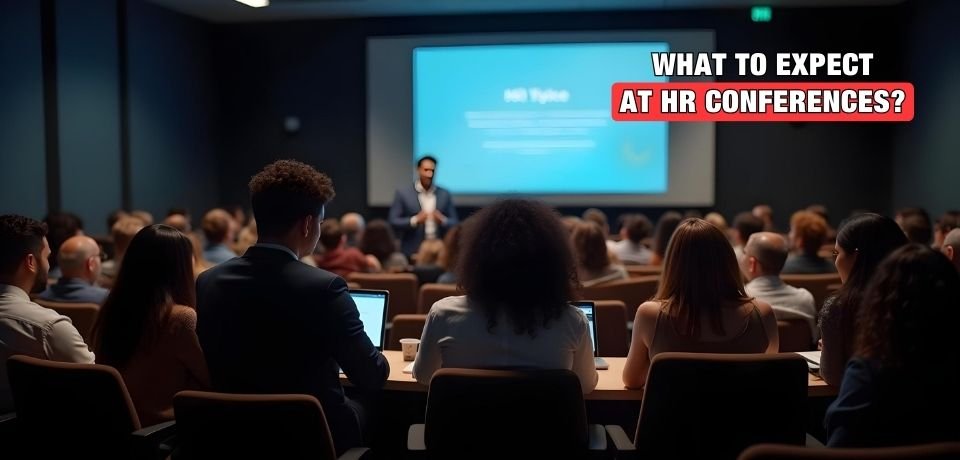The purpose of HR conferences is to bring together practitioners from different sectors in order to share insights and build collaborations between them. These events are designed to inspire and educate attendees through a blend of expert presentations, workshops, and networking opportunities. If you’re wondering what to expect at HR conferences, you have reached the right place.
Prepare for engaging sessions led by industry experts, interactive workshops that encourage hands-on learning, and the chance to connect with fellow professionals. You’ll also discover advanced HR technologies in exhibit halls and gain knowledge from real-world case studies.
Many conferences even offer continuing education credits to help you stay ahead in your career. Read on to find out more about making the most of these invaluable experiences!
How Do HR Conferences Affect the Human Resource Sector?
HR conferences play a vital role in shaping the future of the human resource sector. They offer professionals a unique platform to learn, network, and innovate. These events facilitate the exchange of ideas, leading to advancements in HR practices.

Enhanced Knowledge and Skills
Attending HR conferences provides a wealth of knowledge and skill-enhancement opportunities. Workshops and sessions led by industry experts share the latest trends and best practices. Participants can apply these insights to their organizations, improving overall effectiveness. Continuous learning is vital for adapting to the ever-evolving HR landscape.
Networking Opportunities
Networking is a major aspect of HR conferences, creating valuable connections among attendees. Engaging with peers and industry leaders opens doors to potential collaborations and partnerships. Many professionals find mentorship opportunities that help guide their career growth. Events like an HR conference in Canada emphasize the importance of building a supportive community in the HR sector.
Access to Innovative Technologies
The latest HR technologies are showcased at conferences, offering attendees firsthand exposure to new tools. Exploring exhibit halls introduces professionals to solutions that can simplify their processes. These technologies often enhance employee engagement, performance tracking, and data analysis. Embracing innovation is essential for organizations striving to remain competitive in today’s market.
Real-World Case Studies
Conferences often feature real-world case studies that illustrate successful HR initiatives. Hearing about these experiences inspires participants to implement similar strategies within their organizations. Learning from others’ successes and challenges promotes a culture of continuous improvement. Case studies serve as practical examples that can be applied across various sectors.
What to Expect at HR Conferences?
Conferences in HR provide valuable information and professional growth opportunities. These gatherings unite industry leaders and HR professionals to share insights and strategies. It is important to know what to expect from these conferences so that you can make the most of your time there. Here’s what you should expect from a conference like that:

Engaging Sessions
A variety of engaging sessions await attendees at HR conferences, addressing different interests in the HR field. Keynote speeches often highlight significant trends and innovations in human resources, providing a broad overview of the industry’s current trends. Attendees can also participate in panel discussions, where experts share diverse perspectives on pressing HR issues.
Breakout sessions allow for deeper dives into specific topics, facilitating rich conversations among participants. These small, focused groups create an intimate atmosphere for sharing experiences and asking questions. Engaging sessions encourage active participation, ensuring attendees leave with actionable insights they can apply in their own organizations.
Expert Speakers
Renowned industry leaders frequently grace the stages of HR conferences, sharing their expertise and real-world experiences. Their insights can provide inspiration and guidance for dealing with complex HR challenges. Learning from these experts is an invaluable part of attending conferences, enriching your professional toolkit, and enhancing your strategic thinking.
Often, these speakers share personal stories that resonate with attendees, making their lessons memorable and impactful. Their wealth of knowledge can spark new ideas and encourage innovative thinking among HR professionals. Engaging with expert speakers not only enhances the conference experience but also encourages ongoing dialogue in the HR community.
Networking Opportunities
Networking is a key benefit of attending HR conferences, providing numerous chances to connect with like-minded professionals. Formal networking events, such as receptions or roundtable discussions, allow for structured interactions that can lead to meaningful connections. These gatherings develop relationships that may evolve into future collaborations or mentorship opportunities.
Additionally, casual meet-ups create a relaxed atmosphere for building relationships. Casual interactions can lead to deeper conversations and networking opportunities that aren’t always available in structured settings. The connections made at these conferences can significantly enhance your professional journey and open doors for new opportunities.
Workshops
Interactive workshops at conferences are designed to enhance practical skills that attendees can apply in their workplaces. These hands-on sessions encourage active participation, allowing you to learn through real-life scenarios and collaborative exercises. Workshops often focus on specific skills or tools, providing attendees with a focused learning experience.
Participants can expect to gain valuable insights and practical techniques that can be implemented immediately upon returning to work. Engaging in these workshops creates a deeper understanding and retention of new concepts. The collaborative nature of workshops allows attendees to learn from each other, enriching the experience for everyone involved.
Exhibit Halls
Exhibit halls are active spaces where vendors showcase advanced HR technologies and services. Exploring these exhibits allows attendees to discover innovative solutions that can improve their HR processes. The opportunity to see products in action and ask questions directly from vendors can lead to informed purchasing decisions for your organization.
In addition, these exhibits often feature demonstrations of new tools designed to simplify HR functions. Understanding the latest offerings in the market helps organizations stay competitive and informed about the trends in human resources. Engaging with vendors also opens pathways for future collaborations and partnerships.
Real-World Case Studies
Many conferences feature sessions that present real-world case studies from successful companies. These examples provide practical insights and inspiration for implementing effective HR strategies. Hearing about actual experiences allows attendees to learn from the successes and challenges faced by others, enriching their understanding of best practices.
Presentations of these case studies often include detailed analyses of what worked and what didn’t, offering a comprehensive view of each situation. Such sessions encourage open dialogue, allowing participants to ask questions and share their thoughts. This exchange of ideas can lead to innovative solutions that attendees can take back to their organizations.
Continuing Education Credits
Attending HR conferences often grants opportunities to earn continuing education credits, which are vital for maintaining professional certifications. Many organizations require these credits to ensure their HR staff stays current with industry standards. Taking advantage of these opportunities can greatly enhance your career path and professional development.
By accumulating continuing education units (CEUs), professionals demonstrate their commitment to lifelong learning. This dedication not only enhances individual knowledge but also strengthens the overall capability of HR teams. Engaging in ongoing education helps HR professionals adapt to the rapidly changing landscape of human resources.
How to Find a Suitable HR Conference for You?
You can significantly improve your networking opportunities and professional development by attending the right HR conference. With so many events available, it’s essential to choose one that aligns with your goals and interests. Here’s a step-by-step guide to help you navigate the selection process effectively.
Step 1: Define Your Goals
Begin by clearly outlining your professional development goals and objectives. Consider what you hope to achieve by attending a conference, such as gaining new skills or expanding your network. Identifying your primary interests will narrow down your options and ensure a more fulfilling experience. This step lays the groundwork for understanding the agenda of HR conferences that will meet your specific needs.
Step 2: Research Available Conferences
Utilize online resources to research various HR conferences that suit your interests and objectives. Websites dedicated to HR events often provide comprehensive lists, dates, and locations. Reading reviews and testimonials from previous attendees can offer valuable insights into what to expect. This thorough research will help you create a shortlist of potential conferences.
Step 3: Evaluate the Agenda
Examine the agenda of each conference on your shortlist to assess the topics covered and the speakers involved. Look for sessions that align with your professional development goals and interests. Engaging speakers and relevant topics can significantly enhance your learning experience. Understanding the agenda of HR conferences allows you to choose one that will provide the most value.
Step 4: Consider Networking Opportunities
Evaluate the networking opportunities each conference provides, as this can be a critical aspect of your experience. Look for events that facilitate interactions, such as networking receptions or panel discussions. Engaging with fellow HR professionals can lead to valuable connections and potential collaborations in the future. Networking can sometimes be just as important as the sessions themselves.
Step 5: Assess Location and Logistics
Consider the location and logistics of each conference, as these factors can influence your decision. Determine whether you prefer attending a local event or are willing to travel for a more significant opportunity. Additionally, think about accommodations, transportation, and the overall budget for the trip. Ensuring a convenient and accessible venue can enhance your overall experience.
Step 6: Review Continuing Education Credits
Check whether the conference offers continuing education credits, which can be essential for maintaining certifications. Many HR professionals require these credits to stay compliant with industry standards and enhance their credentials. Participating in a conference that provides CEUs can significantly benefit your career progression. This factor may also help you decide between competing events.
How an HR Conference Can Be Beneficial For Your Career?
A HR conference can have a significant impact on your career build-up and professional development. These events offer unique opportunities to gain insights, expand your network, and enhance your skill set. Understanding the benefits can help you recognize the value of participating in these enriching experiences.

Expanded Professional Network
Building a robust professional network is a key benefit of attending HR conferences. Connecting with fellow HR professionals allows for the exchange of ideas and experiences. Many attendees form lasting relationships that can lead to future collaborations or job opportunities. Networking often results in a supportive community that fosters professional growth.
Access to Expert Insights
Conferences provide access to industry leaders and experts who share their knowledge and experiences. Listening to their presentations can offer new perspectives on complex HR challenges. These insights can be instrumental in informing your strategies and decision-making. The purpose of HR leadership conferencesis to bridge the gap between theory and practice through expert knowledge.
Skill Development
Participating in workshops and sessions at HR conferences promotes skill development customized to current industry needs. Attendees engage in interactive experiences that allow them to practice new concepts in real time. Gaining practical skills enhances your confidence and effectiveness in your role. This hands-on approach ensures you leave the conference equipped to implement what you’ve learned.
Exposure to Industry Trends
Staying current with the latest trends in human resources is crucial for career advancement. Conferences highlight emerging issues, innovative technologies, and new practices within the HR field. Attending these events allows you to understand shifts in the industry and adapt your strategies accordingly. This knowledge positions you as a forward-thinking professional in your organization.
Continuing Education Opportunities
Many HR conferences offer continuing education credits, which are essential for maintaining professional certifications. Engaging in these educational sessions demonstrates your commitment to professional development. Accumulating these credits can open doors for career advancement and enhance your resume. Continuing education is vital for staying competitive in the ever-evolving HR landscape.
Inspiration for Innovation
Attending an HR conference can ignite inspiration for new ideas and innovative practices. Engaging with diverse viewpoints and experiences encourages creative thinking within your role. Exposure to successful case studies often motivates attendees to implement changes in their organizations. This newfound inspiration can lead to significant improvements in HR strategies and initiatives.
Tips to Utilize the HR Conference Experience Effectively
Maximizing your experience at an HR conference can significantly enhance your learning and networking opportunities. With careful planning and proactive engagement, you can make the most of your time. Here are some practical tips to help you utilize the HR conference experience effectively.
- Set Clear Goals: Define what you hope to achieve before attending the conference. Having specific objectives will guide your choices and enhance your focus.
- Create a Schedule: Review the agenda in advance and outline the sessions you want to attend. Prioritizing key events ensures you don’t miss important learning opportunities.
- Engage Actively: Participate actively in discussions, ask questions, and contribute your insights. Engaging with speakers and fellow attendees develops deeper connections and enhances learning.
- Network Strategically: Identify individuals you’d like to connect with and reach out to during the event. Building relationships with key professionals can open doors for future opportunities.
- Take Notes: Keep detailed notes during sessions and workshops to capture important insights. Reviewing these notes after the conference will help reinforce your learning.
- Follow-Up Post-Conference: After the event, reach out to the contacts you made via email or LinkedIn. A simple follow-up message can solidify new relationships and keep the conversation going.
- Share Your Insights: Discuss what you learned with colleagues who couldn’t attend. Sharing knowledge can enhance team discussions and foster a culture of continuous learning.
FAQs about What to Expect at HR Conferences?
Attending HR conferences can be a valuable experience for professionals in the field. Understanding what to expect can help you prepare for the event and make the most of the opportunities available. Here are some frequently asked questions regarding HR conferences.
What Types of Topics Are Covered?
HR conferences typically cover a wide range of topics, including talent management, diversity and inclusion, compliance, and employee engagement. Sessions often include case studies, workshops, and discussions led by industry experts. This variety allows attendees to find areas relevant to their interests.
How Do I Choose the Right Conference?
Selecting the right HR conference involves evaluating your professional goals and interests. Consider factors like location, agenda, and speaker lineup. Research past conferences for content and networking opportunities to ensure they align with your objectives and expectations.
Are There Opportunities for Professional Development?
Most HR conferences offer sessions focused on professional development, including workshops and keynotes. These sessions aim to enhance skills relevant to HR roles, often providing continuing education credits. Engaging in these opportunities can advance your expertise and career prospects.
What Should I Bring to the Conference?
Essential items to bring include business cards for networking, a notebook or device for taking notes, and comfortable shoes. Don’t forget any necessary materials for the workshops or sessions you plan to attend. Being prepared will enhance your overall conference experience.
How Can I Network Effectively at the Conference?
Networking effectively involves approaching others with confidence and preparing an elevator pitch about yourself. Attend social events, engage in discussions, and actively participate in sessions. Follow up with new connections after the conference to strengthen relationships and foster future collaborations.
Will There Be Virtual Participation Options?
Many HR conferences now offer virtual participation options for those unable to attend in person. These options may include live-streamed sessions and recorded content available for later viewing. Virtual attendance allows you to benefit from valuable insights without the need for travel.
Final Words
Conferences provide valuable opportunities for professional development and networking. Understanding what to expect at HR conferences helps you prepare for engaging sessions, workshops, and expert insights. These events not only enhance your knowledge but also connect you with like-minded professionals in the industry.
By embracing these opportunities, you can gain inspiration and practical skills to apply to your work. Ultimately, participating in HR conferences can significantly impact your career trajectory, making it essential to seek out the right events that align with your goals and interests.
